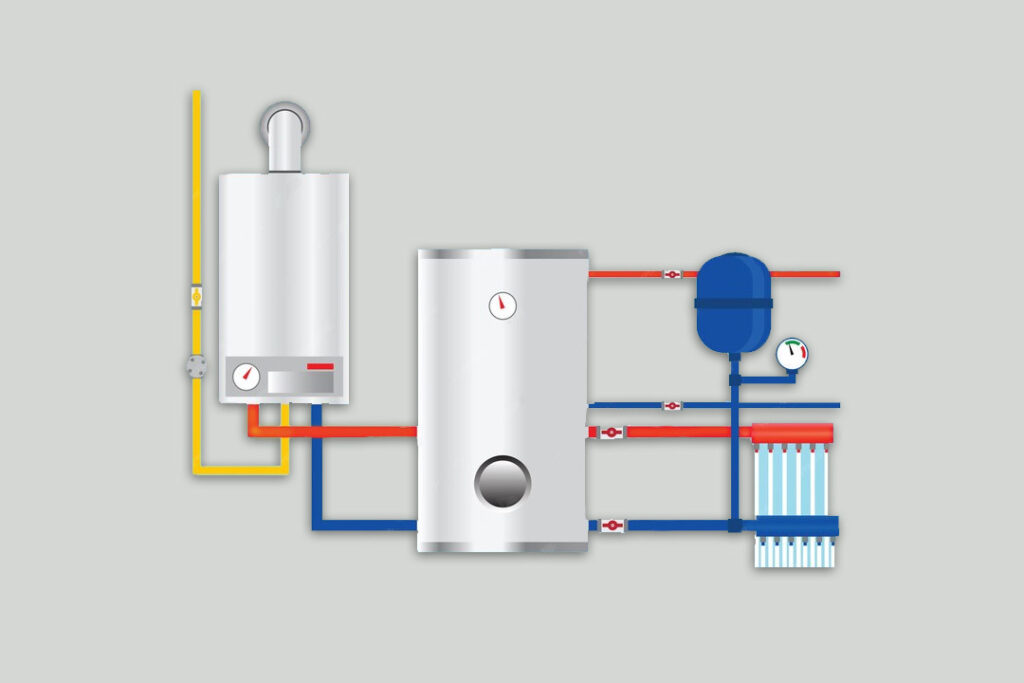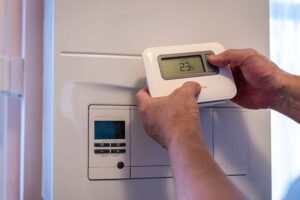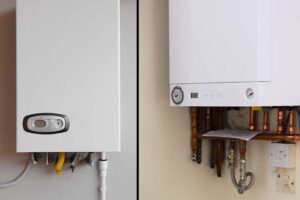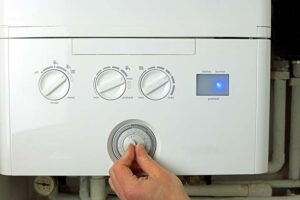Hot water is an important part of making sure that people who live in a home have a good quality of life. The gas central heating boiler is in more than 75% of UK homes, but a lot of people are still unaware of its working. Boilers heat water and heat our homes, but not many people understand how they work.
In the UK, most homes have either a combi boiler or a hot water tank or cylinder that heats water before a boiler or another device sends it to different parts of the house. In this blog, we’ll highlight some key components of combi gas boilers and the significance of each part in heating water.
Understanding the Basics of Gas Boilers
Boilers that use gas heat water to heat homes and provide hot water. They are important parts of central heating systems because they help hot water tanks and radiators heat the whole house evenly.
Different types of gas boilers, like combi boilers, system boilers and heat-only boilers, are made to meet different types of heating needs. Moreover, hybrid boilers make it easy to have hot water right away without consuming too much gas energy. When people know the basics of gas boilers, they can choose the one that best meets their heating needs.
The Role of a Boiler in Home Heating
Gas boilers are the core of home heating systems, generating heat by burning gas in a combustion chamber. They circulate hot water through radiators, warming living spaces effectively. Maintenance is crucial for safe operation. Gas boilers are reliable and offer consistent heating performance, making them a popular choice.
Components of a Gas Boiler
Within a gas boiler, you’ll find key components such as a heat exchanger, burner, and flue. The burner plays a vital role in heating the water, while the pump ensures water circulation throughout the central heating system. Additionally, the thermostat aids in temperature regulation within the boiler. Familiarising yourself with these components is crucial for effective maintenance and optimal performance.
Gas Boiler vs Electric Boiler: A Comparison
Cost and effectiveness are the most important things to look at when comparing gas and electric boilers. For bigger homes, gas boilers are better because they heat water faster and for less money. Due to the cost of energy, electric boilers are a backup way to heat a home.
They are easy to set up. The best heating choice for you will depend on how carefully you look at these factors and how important cost and performance are to you.
How Does a Gas Boiler Heat Water?
In gas boilers, water is heated through a process involving combustion, heat exchangers, and circulatory systems. The burner ignites gas to heat a chamber where water passes through, absorbing the heat. This hot water is then circulated for various uses in the heating system.
The Process of Water Heating in Gas Boilers
Unlocking the magic of gas boilers, these systems efficiently heat water from the mains using a burner. The primary heat exchanger then transfers this warmth to the water for distribution to taps and radiators. Regulated by a thermostat, gas boilers ensure a consistent temperature, offering comfort and convenience.
The Role of Heat Exchangers in Gas Boilers
Heat exchangers in gas boilers facilitate the transfer of heat from the burner to the water, enhancing efficiency. These crucial components ensure effective utilisation of produced heat for consistent heating. Gas boilers with superior heat exchangers offer reliability. Understanding the functionality of heat exchangers is pivotal in optimising gas boiler performance.
Why a Hot Water Cylinder Isn’t Needed in Combi Boilers
These days, combi boilers heat water quickly, so you don’t need a hot water tank. These boilers heat and heat water without a tank, which saves room. Combi boilers are easier to install and pipe because they don’t have a hot water storage tank. It’s easy to use a combi boiler, which gives you hot water without the need for a hot water tank.

Exploring Different Types of Gas Boilers
Check out the different kinds of gas boilers. With a combi gas boiler, you don’t need a tank because the hot water is always ready to use. Heat-only gas boilers are best for homes that need to heat and store things. System gas boilers work with standard heating systems. Each type meets the needs for hot water and room. You can choose the best gas boiler for heating if you know the differences.
Combi Gas Boilers: An Overview
Combi gas boilers are small, work well and can be used for both heating and hot water. These devices don’t need tanks because they heat water and make it hot quickly. Combi boilers are popular for smaller homes because they use less energy and are easy to set up. People who want a space-saving way to heat their homes often choose this boiler because it is easy to use and doesn’t cost a lot of money.
Heat Only Gas Boilers: What You Need to Know
Gas boilers that only heat are great for homes that have systems that spread the heat around. There needs to be a separate hot water tank, but these boilers provide hot water for central heating. Because they are so useful, they are perfect for bigger homes with lots of bathrooms or hot water needs. It might be smart and efficient to heat your home with a gas boiler that only provides heat.
System Gas Boilers: A Brief Introduction
System gas boilers with sealed hot water tanks work great in homes with more than one bathroom. The spread of water is sped up by heating water for taps and general heating systems. These days’ boilers are smaller, which makes installing them in homes easier.
Advantages and Disadvantages of Gas Boilers
Boilers that use gas heat homes quickly and efficiently, and they also provide hot water for many uses. Many people like them because they are cheap, especially when linked to a main system. But gas equipment needs to be maintained and there are risks involved. When considering gas boilers for home heating, you should think about how safe they are and how much energy they use.
| GAS BOILER | |
| Benefits | Limitations |
|
|
Safety and Maintenance of Gas Boilers
For gas boilers to work at their best, they need to be maintained in a safe and effective way. Often check the type of boiler and the water flow. It is very important to check the hot water tap, learn about hybrid boilers and take care of the central heating boiler. If the pressure from the mains is low, you might be told to get a new boiler.
For safe use, keep an eye on the waste gases, water boiler, hot water tank, and hot water storage cylinder. Condensing boilers make modern combi boilers more efficient and cut down on waste gases. These boilers use fewer pipes.
Are Gas Boilers Safe?
Gas boilers ensure safety when correctly installed and maintained. Routine servicing reduces malfunctions, while built-in safety features prevent accidents. Proper ventilation and carbon monoxide detectors enhance security. Compliance with building regulations is crucial for maintaining gas boiler safety.
Signs to Look Out for to Know if You Need a New Gas Boiler
If your energy bills are on the rise, your gas boiler might be inefficient. Inconsistent heating or limited hot water could indicate underlying boiler issues. Investigate any strange noises or odours coming from the system. A persistently problematic pilot light could mean your boiler is failing. Consider replacing your gas boiler if it exceeds its recommended lifespan.
Tips on How to Maintain Your Gas Boiler
To keep your gas boiler in top shape, ensure even heat distribution by bleeding radiators regularly. Monitor water pressure and top up when needed to maintain efficiency. Maintain a clutter-free area around the unit for proper ventilation. Prevent freezing during cold spells by insulating pipes effectively.
Remember to schedule annual professional servicing to optimise the performance of your gas boiler. These simple maintenance tips can help prolong the lifespan and efficiency of your heating system.
The Future of Gas Boilers
What’s next for gas boilers, which are a common way to heat homes? Will gas boilers soon be replaced because of growing worries about the environment? The search for fuels other than gas is very important. Gas boilers may be taken out in 2026, which makes people worry about their home heating systems. With new technologies and eco-friendly options coming out, the environment and economy need to be weighed. It might be best to accept more modern, eco-friendly options.
Will Gas Boilers be Replaced in 2025?
By 2025, changes in rules and technology might mean that you don’t need to replace your gas boiler. As the energy economy rises, more and more people will switch to heating choices that are better for the environment.
Alternatives to Gas Fuel for Boilers
Alternatives to gas-based boiler fuel give you a few choices. Electric boilers that use sun or biomass energy are better for the environment. Heat pumps and hydrogen boilers offer a better way to heat homes in the future. These options use less gas and are better for the environment when it comes to heating solutions.
Inside a gas boiler
To understand how a boiler works we need to look at the various key components that you’ll find inside a gas heater:
| Key Components Inside a Gas Boiler | |
| Gas burner | This generates the heat which is used to warm your home. |
| Heat exchanger: | A device that is used to transfer heat between a solid object and fluid. |
| Control technology | Used to control the function of your gas heating system. |
| Diaphragm expansion vessel | Diaphragm tanks are pressurised water vessels which allow the water to expand and absorb pressure surges that happen during heating. |
| Exhaust pipe | Often a thin plastic pipe is pulled through the chimney to remove traces of carbon monoxide that is produced as a by-product of the gas boiler heating process. |
Choosing the Right Gas Boiler
Pick a gas boiler based on the type of boiler you have and the water flow where you live. You can make a better choice if you know the difference between a combi boiler and a central heating boiler. You might want to think about getting a new boiler if you don’t need a hot water tank or mains flow. These days’ combi boilers with ERP scores use less energy and have fewer pipes. To choose the best option, you need to think about the type of system, what the room thermostat can do, and how well you know how to set it.
Factors to Consider When Buying a Gas Boiler
When you are installing a gas boiler, you need to think about:
- Where to put it and whether it will work with your current heating system.
- To meet the needs of your home, think about the hot water output, flow rate, and economy.
- Look for automatic shut-off valves to make things safer.
These things will help you pick a gas boiler for your home that is safe and works well.
Best Gas Boiler Brands to Consider
Worcester Bosch gas boilers are the most reliable and efficient, but Vaillant also has a lot of great options. Ideal boilers are reliable and cheap, while Baxi has a range of gas boilers. These smart and long-lasting gas boilers give some brands a strong edge over its competitors. To help customers find the right fit for their homes, these businesses offer a range of boiler models to meet different requirements.
Through the government boiler scheme, you might be eligible for a free boiler replacement to replace your outdated, non-condensing boiler with a more efficient one, improve your home’s energy efficiency, and reduce your carbon footprint. Check if you qualify now!
Does a Gas Boiler Need Electricity to Operate?
The pump, igniter and buttons on a gas boiler all need electricity to work. Power-dependent parts are the ones we have now. This power source meets a small but important electricity need for moving hot water around.
Conclusion
Gas boilers play a significant role in home heating systems because they heat water quickly and efficiently. To get the best results, you need to know how to use, maintain, and fix gas boiler parts. Gas boilers have many benefits, but safety and limitations must be thought about. Gas boiler technology could be changed by future study into models that use less energy and other fuels. When getting a gas boiler, think about how much energy it uses and how well-known the name is. Keep up with changes in gas boiler technology to keep your home warm.








